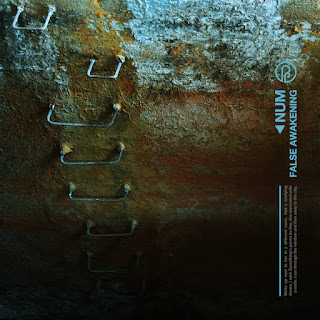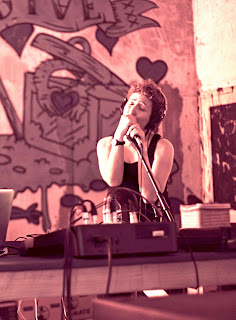NUM: False Awakening
Navel-Gazers #26 is an interview with Milad Bagheri and Maryam Sirvan a.k.a. NUM who are going to talk to me about False Awakening. NUM - currently based in Calgary, Alberta - were formed originally in the remote city of Rasht in northern Iran. Really, both of those locations strike me as pretty mysterious! and the same could be said of ‘False Awakening’… I’ve got to say I’ve never heard anything quite like this album. Superficially speaking there’s nothing too unusual here - it’s two tracks long, soundscapes, around 15 minutes each… there’s a certain mix of electronics, instrumentation and voices which is familiar enough in the world of experimental music.. yet there’s something about the mood and intensity of this stuff which really gets under my skin. ‘False Awakening’ is something else. I’ve rarely encountered a recording so… harrowing, so imposing, unsettling… and I keep coming back for repeated listens to partake in the NUM mystery and venture back into the abyss. Of course I am also curious about the duo’s origins, in the unlikely locale of Iran and later in nearby Tbilisi, Georgia where they were also based for awhile. Who are these two? And where exactly does this music - with its very peculiar sensibility - come from? Let’s talk to NUM!
AC: Thank you both for joining me on Navel-Gazers. As you can imagine I have a lot of questions about ‘False Awakening’ but before we get to that I wonder if you could tell us about your background? Northern Iran is such an interesting corner of the world and our readers will surely be curious to know how you got started doing music over there.
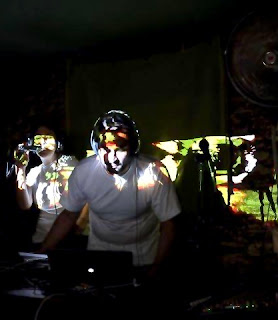 Maryam Sirvan: Thanks for having us on Navel-Gazers! We're originally from North of Iran, we both grew up close to the Caspian Sea and the mountains, We both were studying at the same university and I first met Milad at a concert he played with a few other people at our university 14 years ago, they played a bunch of rock/electronic music at that time. Right after we met, we decided to cover some of my favourite songs together, soon after that, we started to make our own music together, at first me as a vocalist and Milad as a songwriter then gradually our roles became different as we grew up together and explored different dimensions of music and our tastes in music continued to change over time, we got more and more into the electroacoustic/acousmatic/experimental music. We've been making music together since then and besides that, we both have our own solo projects too.
Maryam Sirvan: Thanks for having us on Navel-Gazers! We're originally from North of Iran, we both grew up close to the Caspian Sea and the mountains, We both were studying at the same university and I first met Milad at a concert he played with a few other people at our university 14 years ago, they played a bunch of rock/electronic music at that time. Right after we met, we decided to cover some of my favourite songs together, soon after that, we started to make our own music together, at first me as a vocalist and Milad as a songwriter then gradually our roles became different as we grew up together and explored different dimensions of music and our tastes in music continued to change over time, we got more and more into the electroacoustic/acousmatic/experimental music. We've been making music together since then and besides that, we both have our own solo projects too.AC: Ok so I'm curious about the less-experimental music that you mentioned starting out with originally, with the songwriting and vocals. What kind of music were you into? Would that have been along the lines of Western music, or Middle Eastern? Then, how did you get the exposure to experimental music and did you know many other people who were interested in it?
Milad Bagheri: The very first songs we made together were a blend of trip-hop and dream-pop with soundscapes. I could say the results were something between experimental pop and ambient (some of the songs are available on our Bandcamp and SoundCloud). Time by time we got more into electroacoustic and experimental music. It happened gradually in 3-4 years. We started to listen to more noise, ambient, drone, and electroacoustic music. Based on the community we were close to in that period of time in Iran (2010-2015 approximately) we got familiar with different practices in electronic music both in popular culture (ambient, electronica, etc) and the academic sphere (electroacoustic, sound art, etc). Time by time our music turned more to soundscape and less pop elements. In 2017 we moved to Tbilisi and I started to study in a Music Technology course at Tbilisi State Conservatoire and we got close to a new community of electronic musicians including composers, producers, DJs, and performers. Actually, in False Awakening we have a guest artist on saxophone and electronics (Reso Kiknadze) who was the rector of the Tbilisi State Conservatoire by that time.
AC: Let's talk about 'False Awakening'. Can you explain the background of this music? Where did it come from? Is it something you planned out carefully, or is it more of an improvisation? What can you tell me about the “NUM space" in Tbilisi where it appears to have been recorded?
The saxophone is great!
Maryam Sirvan: "False Awakening" actually was born out of the live-set version we played online at a festival called Audio Art in Krakow, Poland. We were dealing with so many stressful/chaotic situations at the time it was produced and recorded (mostly because of our nationality as always! so many unnecessary, brutal obstacles which seem to exist only for us and people like us from certain parts of the world!) so maybe that explains the dark atmosphere of the album! The whole process of recording including the vocal part and production happened in our tiny studio apartment in Tbilisi and the saxophone part at the Tbilisi State Conservatory. The saxophone line is mostly some modified parts of an improvisational session by Reso Kiknadze.
Milad Bagheri: Yes, the whole story around "False Awakening" started when we got the invitation to Audio Art. It’s an annual academic event dedicated to sound art and electroacoustic music. The curator of the festival sent an invitation asking for a collaborative live performance between NUM and Reso Kiknadze. We ended up with a plan where we as NUM would make our AV performance and then Reso would improvise with processed saxophone and electronics on top of our music. Reso is a great jazz musician, performer, improvisor, and electroacoustic composer. Due to some issues with the visas (that's often a problem for us as Iranian passport holders!!!) we couldn't make to go to Poland but instead, we performed the live set (which later got the title False Awakening) as a hybrid live set. We played at our apartment in Tbilisi and the Audio Art people streamed it in the venue while Reso was present there and improvised on top of that. It happened in 2019 just a year before the pandemic, so, we streamed our performance which by that time was a bit meaningless. However, one year later, streaming got really popular due to the Covid-19 regulations.
 One early morning, during the period that we were producing the album out of the live set materials, I had a dream and a chain of false awakenings within that dream. All the notes and titles in the album comes from that dream. For instance, Watching Myself From The Corner (track 1) was the situation I really experienced in that dream. I shared my dream with Maryam and we both thought it really fits the lyrics Maryam wrote for the first track, so we decided to call the album False Awakening.
One early morning, during the period that we were producing the album out of the live set materials, I had a dream and a chain of false awakenings within that dream. All the notes and titles in the album comes from that dream. For instance, Watching Myself From The Corner (track 1) was the situation I really experienced in that dream. I shared my dream with Maryam and we both thought it really fits the lyrics Maryam wrote for the first track, so we decided to call the album False Awakening.AC: I wonder if there's anything else you remember about that dream Milad? And what's the meaning behind the other title, I'm Flying Over The City?
Milad Bagheri: The dream I've mentioned which inspired me for the title, was a series of false awakenings. First, I dreamt that Maryam and I were living in a dark depressive apartment without any windows. I was thinking this should be one of those soulless apartments in downtown Tehran which we hate a lot, to be honest. But, you know, in the world of dreams, you feel you've been there, you somehow accept the reality your eyes are seeing. Then something scary happened. We both felt the house is hunted by a strong evil invisible force. I was so scared that I realized I was dreaming and I woke up, but it was a false awakening! ...
(We put this part on the CD cover art). Woke up next to her in a different room, "had a terrifying dream", I said. "Everything's gonna be fine", she murmured with a smile. I ran through the window and flew away to the city. In this part of the dream I could watch ourselves talking from the corner close to the ceiling. I borrowed the title of the first track from this part. The dream continued with a series of false awakenings until it turned to a lucid dream where I could control the reality.
We were at a beach in one of the episodes of the dream which looked like the place I grew up. I remember It was part of the dream that I had control over the events. Here was the place that we started to fly over a city that was somehow a combination of all place I'd been by that time.
Anyways, it feels a bit strange to talk about a dream in the past. I think my brain messed up with some parts and probably changed the components/events a bit. But in general, I remember that dream in the way that I described it above. :-)
Question for Maryam, you're credited with field recordings on this album, in addition to text. Could you tell us about both?
Maryam Sirvan: I have a field recordings archive which includes my daily field recordings, we usually try to create personal atmospheres and textures using field recordings and other sound sources - in "False Awakening" we digitally manipulated field recordings to the extent that the original sources were not recognisable, and this is the area in electroacoustic music and composing that fascinates me the most, the freedom of creating your own special sounds and atmospheres.
AC: Could you tell us more about the text? It always interests me when people are multi-lingual.. I’m guessing you speak Persian, and maybe Georgian..? And obviously English. When you improvise the text, is it in one of those languages or is it just… utterances? Is there a language you “think” in?
Maryam Sirvan: Well, to be honest coming up with the text has always been a challenge for me in both English and Persian and surprisingly writing in English is somehow easier for me and gives me more freedom to express myself (unfortunately I only know a little bit of Georgian). It's extra pressure and labor added to the hardship of composing a piece in my opinion, I mostly find the text part unnecessary, I believe everything can be said without the words and only by the means of music itself, or maybe that's because I've never managed to write something I haven't hated right away so far. It also gives some kind of unwanted directions to music which I mostly try to avoid and prefer to only stick to the world of sound.
But for some reason, I still try to write the texts from time to time, also I have tried in some of our works some sort of texts without meaning in any specific language. For example, in a piece called Tinted With Sore (NUM's single released by Zabte Sote as part of a compilation called Girih: Iranian sound artists) I only used some non-lexical vocables which sounded good to my ear! Also, in another piece in which I collaborated with another artist recently and hopefully is going to be released soon, I used the same technique.
AC:  ‘False Awakening’ made a powerful impression on me as a listener. I’ve replayed it several times. How have others reacted to it? Generally speaking how do people respond to your work and does it ever reach the ears of people who are not familiar with experimental music?
‘False Awakening’ made a powerful impression on me as a listener. I’ve replayed it several times. How have others reacted to it? Generally speaking how do people respond to your work and does it ever reach the ears of people who are not familiar with experimental music?
 ‘False Awakening’ made a powerful impression on me as a listener. I’ve replayed it several times. How have others reacted to it? Generally speaking how do people respond to your work and does it ever reach the ears of people who are not familiar with experimental music?
‘False Awakening’ made a powerful impression on me as a listener. I’ve replayed it several times. How have others reacted to it? Generally speaking how do people respond to your work and does it ever reach the ears of people who are not familiar with experimental music? Milad Bagheri: Well, this one is a tricky question. We know our music is not easy listening at all. It might be our taste or even our fault!
First of all, False Awakening includes two long pieces. These days, most people won't listen to long pieces due to many different factors, especially if you aren’t famous (like our situation). The other problem is, there is no clear boundary between experimental electroacoustic music and ambient music in the market, at least I feel it is this way. When you produce a work which can't be categorized as pop electronics, it's possible that the market realizes it as ambient music even though it's not! I mean, False Awakening is a process that one should follow from the beginning to the end, otherwise it's not going to work. Finding listeners who can follow your work entirely is not that easy, at least it's not for us! Moreover, there are a lot of good artists out there and unfortunately, you'll end up competing to be listened to, which is totally the wrong artistic criteria. The market and art are two utterly different things, totally out of our control.
So, generally speaking, our works haven't been delivered properly even to the listeners who are familiar with experimental music, I believe. We've got feedback about False Awakening but, to be honest, not that much that we feel satisfied with. After years of working and composing we now have zero expectations regarding feedback and to be listened to!
Maryam Sirvan: Yeah people mostly describe our works as "Dark", "Depressive", "Intense" or even "Boring" and I don't blame them at all, I get what we produce doesn't fit in the category of the so-called "Calming" or "Healing" music most people are into and as Milad said, our works are not easy listening at all but this is how our brains function and we don't want to go against the natural flow of it.
AC: People have very short attention spans! I think your work deserves wider exposure.
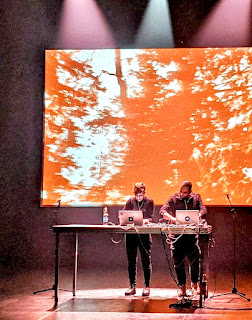 Poking around on the internet the last few years I've been impressed at the large amount of experimental music and related art forms coming out of Iran. Who are some other Iranian artists you guys would recommend... and/or Georgian? (Don't say Ray Charles and R.E.M.!!)
Poking around on the internet the last few years I've been impressed at the large amount of experimental music and related art forms coming out of Iran. Who are some other Iranian artists you guys would recommend... and/or Georgian? (Don't say Ray Charles and R.E.M.!!)Milad Bagheri: You're right, experimental and electroacoustic music scene in Iran is rich, colourful, and diverse. This compilation works better than any recommendation, I believe.
Also about the experimental scene in Georgia, there's not much going on, but this record can work as an introduction to some artists active in experimental scene.
Maryam Sirvan: Just to add some of the Georgian musicians whose music I like and listen to a lot ( I don't know if I can call them Experimental musicians but they're all experimenting with music in their own way and they all have their own unique way of sounding): Aine Merme (Natuka Natsvlishvili), Zuka Simonishvili, Sandro Bibich, Fotgjengeren (Christopher manning US/Geo), TeTe Noise.
AC: Thanks for these recommendations! Somehow I've already heard of TeTe Noise, the rest I'll surely be checking out.
Wrapping up our discussion here... what's next for NUM? You guys have just moved to Calgary (Canada), what are your plans there, and do you have any current or upcoming projects you'd like to tell our readers about?
Milad Bagheri: Right now, a blend of the ongoing pandemic and the process of moving to a new continent, is making everything so confusing and unsettling. In addition, dealing with the record labels in the world of experimental music is another pain to deal with. We have four decent records waiting to find a home to be released on. The music market is being overwhelmed with content, I believe. Sometimes I think releasing music is somehow unnecessary. There is a lot of untouched/unheard high quality music out there and everyone is competing to be heard. To be honest, I hate to compete for art, it's too cheap to do so! Sorry for my hopeless tone, I'm dealing with a lot of pressure right now and future doesn't look so bright!
Anyways, no matter what's going on, as always, we are doing experiments on some new sounds, as well as preparing a new live audiovisual set, and working on a multidisciplinary drama performance in collaboration with a Calgary based artist. I am also studying for my master's degree in Sonic Arts at the University of Calgary and am conducting a research on a music technology related topic.
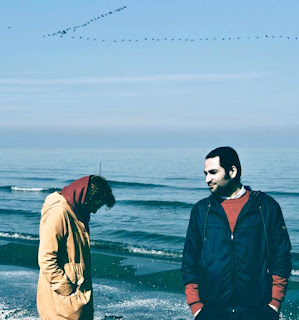 Maryam Sirvan: As Milad said dealing with record labels is so exhausting and sometimes we think that's a better idea to put out our works as self-releases so maybe we do that in the near future as we have so many unreleased works for which we've been searching a home to suit them well. We're also still exploring the new environment and the music scene here, I guess we need more time to get to the normal pace we had before here.
Maryam Sirvan: As Milad said dealing with record labels is so exhausting and sometimes we think that's a better idea to put out our works as self-releases so maybe we do that in the near future as we have so many unreleased works for which we've been searching a home to suit them well. We're also still exploring the new environment and the music scene here, I guess we need more time to get to the normal pace we had before here.AC: I share your pessimism and dismay! I suppose one consolation would be that in the 21st century we have those options on the table now to self-produce and self-release... I'd encourage you to take that approach. Having said that, if any of our readers are in the label biz, have a listen to NUM!
Thanks very much for talking to me.
Maryam Sirvan: Thank you so much for taking an interest in us! it was a pleasure talking to you!
